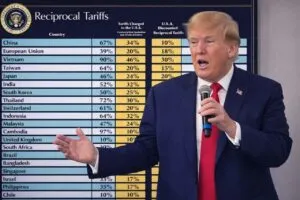Today, I’m putting the spotlight on something that’s been on my mind for a while: the disconnect between wages in the entertainment industry and the skyrocketing cost of living.
It’s no secret that life’s gotten a lot more expensive over the past few years, and if you’re like me, you’ve probably noticed it at the grocery store, at the pump, and even in your monthly rent.
But what about those working behind the scenes in entertainment? Are they keeping up, or are they just hanging on?
Let’s break it down together because, honestly, it’s a bit of a mixed bag. The entertainment industry, whether it’s the glitz and glam of Hollywood or the hustle of casinos on the Vegas Strip, has always been known for big money, but that doesn’t necessarily trickle down to everyone involved.
Let’s look at what’s going on, from star-studded salaries to the struggles of those in the background.
Table of Contents
ToggleBig Bucks at the Top, Peanuts for the Rest?

When we talk about wages in entertainment, it’s easy to get lost in the numbers tossed around for top-tier actors and directors.
For example, A-list actors can easily pull in $20 to $30 million per film, and let’s not even get started on directors like Christopher Nolan or Quentin Tarantino, who can negotiate deals worth $5 to $10 million per project.
But what about the crew members, the folks in the writer’s room, or those setting up lights on set? Their pay is a different story. As per the Writers Guild of America, a first-time screenwriter’s compensation for a draft could be around $100,000.
That might sound like a solid figure, but in an industry where work can be feast or famine, it’s not as cushy as it appears. Plus, not everyone gets to join a union like the WGA. Many non-union writers and crew members get a fraction of that—if they’re lucky.
Life After COVID

Let’s rewind to 2020, when COVID threw a wrench into pretty much everything, especially entertainment. Productions came to a halt, theaters shut their doors, and even casinos that depend on live shows for revenue took a major hit. On the other hand, online platforms like Casinos.com kept on working and even thrived throughout this period.
For a while, it seemed like everything would just bounce back, but that hasn’t exactly been the case.
Sure, the blockbusters and big projects are rolling again, but freelancers and contract workers? Many are still scrambling to make ends meet.
The pandemic made the already unstable nature of entertainment jobs even more fragile. For casino dealers, performers, or live show crew members in Las Vegas, the pandemic meant their livelihood could disappear overnight.
While some companies have bounced back with renewed vigor, not everyone in the industry saw their wages recover at the same pace.
Inflation

We’ve all felt the sting of inflation lately, right? From higher rents to soaring grocery bills, it’s been hitting hard.
The entertainment industry is no exception. Even as inflation rates have been hitting record highs, wages for many in the sector haven’t seen the same upward curve.
The idea behind Cost of Living Adjustments (COLAs) is simple: when inflation rises, wages should follow suit to keep purchasing power steady. But let’s be real—just because it makes sense doesn’t mean it happens, especially for those who aren’t covered by unions or long-term contracts.
Freelancers, especially, often find themselves negotiating contracts that haven’t quite caught up with the economic reality.
Union Efforts and Strikes
Now, let’s give credit where it’s due. Unions like SAG-AFTRA, the Writers Guild, and IATSE have been fighting tooth and nail to get fair pay for their members. The strikes in 2023, for example, were a game-changer.
Writers and actors took to the streets, demanding better wages, improved streaming residuals, and safeguards against the encroachment of artificial intelligence on their jobs.
The impact of those strikes? As Spectrum News writes, a massive $3 billion hit to California’s economy. That’s a lot of zeros.
But it wasn’t just about money. It was also about making sure jobs wouldn’t be replaced by algorithms. And, yes, they did secure some wins—better pay for streaming content and protections against AI—but it’s clear there’s still a lot of ground to cover. For many, the fight isn’t over, especially for those who don’t have union support.
The Streaming Problem

I’m sure you’ve noticed the rise of streaming platforms like Netflix, Disney+, and Prime Video. They’ve changed the game for how we consume entertainment. But what’s the reality for those creating the content? Not as glamorous as you might think.
The streaming boom brought new opportunities, but it also shook up how people get paid. In the past, actors, writers, and crew members would get residuals every time a show was rerun on TV.
But now, with streaming? The rules are different, and the payouts are, well, not as generous. Contracts with streaming services often offer lower residuals, which means less money trickling in for years to come.
It’s great if you’re in a hit series like Stranger Things, but if you’re part of a niche show, good luck getting those checks to keep up with your rent.
The Freelancer’s Dilemma

One thing that often gets overlooked is just how many people in entertainment are freelancers. Unlike full-time employees, they don’t have the luxury of benefits like health insurance or paid time off.
Instead, they’re piecing together gigs to pay the bills. And while that freedom can be exhilarating, it also means they’re hit hardest when inflation rises, but their rates don’t.
Freelancers in entertainment often find themselves stuck between accepting lower rates or holding out for something better that may never come.
Without the safety net of a union contract, they have to fend for themselves. And, let’s face it, the cost of living isn’t going down anytime soon.
Global Struggles
We’ve mostly talked about the U.S., but this isn’t an isolated issue. Across the pond in London, the entertainment industry faces similar problems. With rent prices soaring, folks in film, television, and live theater are struggling to make it work. Some production companies have raised wages, but often, it’s still not enough to keep up with the rapid rise in living expenses.
Meanwhile, the global nature of streaming means that projects can move to where labor is cheaper. For instance, outsourcing skilled work to regions like Eastern Europe or Southeast Asia has become more common, which can push wages down in higher-cost areas.
Closing Thoughts
The entertainment industry is a driving force in our culture and economy, but it needs to take better care of its people, especially the ones who aren’t walking red carpets.
It’s about time the industry got real about making sure everyone, from writers and set designers to casino workers and stagehands, can earn a living wage that keeps up with today’s realities.
We’ve seen some progress, but let’s not stop pushing for better wages, better protections, and a better future for all those who make our favorite movies, shows, and performances possible. Because at the end of the day, everyone deserves a fair shot at keeping up with the cost of living.
References
- screenrant.com – Highest Paid Movie Actors Of All Time
- wga.org – Screen Compensation Guide
- ssa.gov – Cost-Of-Living Adjustment (COLA)
- spectrumnews1.com – Hollywood actors, writers strikes have cost CA economy $3 billion, expert says
- apnews.com – What residuals are — and why Hollywood actors and writers are striking over them
Related Posts:
- Safest Countries in the World in 2025 - GPI…
- 25 Most Dangerous Cities in US - Updated Statistics for 2026
- What Is the 3X Rent Rule? - How It Impacts Apartment Hunt
- Capital Cities in Europe: Top Destinations For You…
- America's Murder Capitals: A 2026 Ranking of the…
- 13 Richest Cities in the US 2025 - Luxury, Money,…








